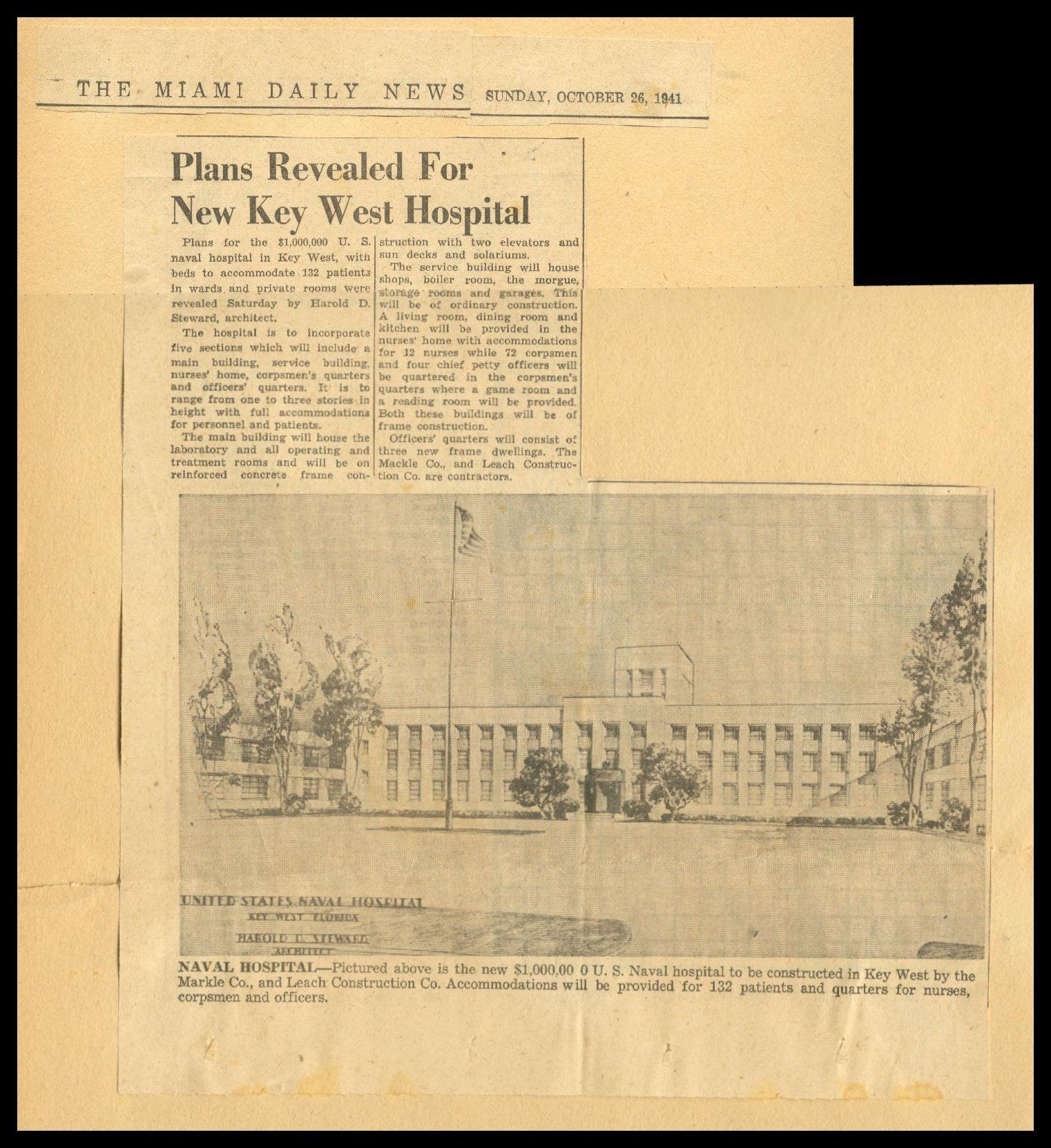FRANK ELLIOTT MACKLE SENIOR
FRANK’S GRANDFATHER - PATRICK MACKLE
Patrick, born in Ireland around 1824, emigrated from Ireland to England by 1847. Patrick married Sarah Flannagan in Fleetwood England in 1847. Patrick’s marriage certificate shows his father as Timothy Mackle.
Patrick must have immigrated in the period around the Irish Potato Famine of 1846-1852. His marriage record in 1847 shows him as a Porter and his wife Sarah Flannagan as a Servant.
From census and other records, we know that Patrick resided in Fleetwood England from 1847 to at least 1861. He is shown as a Clerk for the Steam Packet Company in the 1861 census. Sarah is listed as a Laundress. They have a daughter and three sons including James.
Census records then show Patrick, Sarah and two children in Liverpool, England in 1871.
FRANK’S FATHER - JAMES MACKLE
James, Patrick’s son, one of four children, was born in Fleetwood in 1850. In the 1861 census he is young boy with Patrick and Sarah and his three siblings. In the 1871 census, now 21 years old, he is no longer with his birth family but is residing in Barrow in Furness as a lodger with the Rawcliffe family.
James married Nancy Rawcliffe on September 2, 1871, in Barrow in Furness.
James was, apparently, a prominent man in the town of Barrow in Furness. News articles at the time of his death describe him as a “well known townsman”. Records show him being elected to the School Board in 1881 and again in 1884. In an 1884 advertising soliciting votes reads VOTE FOR MACKLE – Who Has Stuck to His Promise. Family stories handed down were that he was an Inn Keeper in Barrow. One surviving newspaper clip prior to his death says that “sawdust was laid in front of the Alexandra Hotel to prevent any sound from passing vehicles”. I can only assume that the Alexandra was his hotel and perhaps where the family was living at the time.
In November 1886, James passed away at the age of 35. News articles reported. “He is suffering from inflammation of the lings, produced by a severe chill which was contracted during his recent visit to Liverpool to attend the National League Conference.” Another article said “For some weeks Mr. Mackle has been suffering from a most painful illness. This culminated in brain fever, and on Thursday he succumbed to the malady.”
Despite his “prominence” a note from a J. P Hodgson to Nancy in early 1887, a bit after his death, says, “In reply to yours of last week. I have seen J.R. Bell & Wm (unreadable); & they say that all cash in ha(n)d will be required for expences (sic) & that there will be nothing for either you or your creditors. It seems to me to have been a very expensive affair;”

FRANK E. MACKLE SENIOR
Frank Elliott Mackle was born to James and Nancy in Barrow-in-Furness, England in 1881. He was the youngest of four sons. Brothers William (1871), James Jr (1875). and Frederick (1878) preceded him.
His father, James, died in 1886, when Frank was five years old, apparently leaving his wife and son penniless. His widowed mother, however, was resourceful. Less than a year later she married John Kendall in October 1887. A year after that, in 1888 she and her four boys boarded a ship for America.
Frank was six or seven when he left his home in England in 1888. The family settled in Elizabeth, New Jersey.
Apparently, they moved quickly to become citizens. Records show nine-year-old Frank petitioning for citizenship in March 1890. Presumably, his three older brothers and his mother petitioned at the same time.
Family stories did not mention John Kendall coming with them, but he appears with them in Elizabeth city directories from 1895 to1901. Thereafter all records of him are lost.
Frank grew up in Elizabeth New Jersey in the late 19th century and the turn of the 20th. Elizabeth was – and is - an industrialized town on the north coast of New Jersey town, a few miles from New York City.
Around 1896 - when he was about fifteen years old - Frank went to work in the steel and ship building industry of Elizabeth.
According to his son, Frank Jr., his father - in his youth - had been a prize fighter as well.
Frank became a citizen of the U.S. in 1902 at the age of twenty-one – twelve years after his petition.
He lived in Elizabeth until about 1903 or 1904 when he moved to Quincy, Massachusetts to work in the steel yards there. Frank was about 22 or 23.
In or near Quincy Frank was employed as a foreman on the first all-steel submarine which was built by Charles M. Schwab and the Fore River Ship Building Company.
It was in Quincy that he met Theresa Roche. On January 5, 1908, Frank and Theresa were married in Quincy. Frank was 26 and Theresa was 22 years old.

JACKSONVILLE
Further details are lost now but the image is one of a very tough, self-assured young man. Those qualities - and perhaps his new bride - motivated him to leave the ship building job and set out on his own.
In 1908 - soon after their wedding - Frank and Theresa moved to Jacksonville. Their first son, Elliott, was born in that city late in the same year.
It was in Jacksonville in 1908 that Frank Sr. began the family construction business.
The article on the right - apparently from a Boston or Quincy paper announces the move to Jacksonville.
A big step for a young man of twenty-six years of age!
Frank, Theresa, and Elliott lived in Jacksonville until 1911 when they moved to Atlanta.
His business in the early years was one of a General Contractor specializing in the erection of steel structures. He initially operated under the name of the Southern Erecting Company.
One other story Dad related late in life was that his father had come to Miami during his residence in Jacksonville - or perhaps a little later - to bid on the construction of Vizcaya. Vizcaya was eventually constructed between 1914 and 1916.
It was in Jacksonville - around 1911 - that he suffered his first major business setback.
Dad's story went that his father was a contractor on a bridge in the Jacksonville area and when a storm and resulting flood wiped out the under-construction bridge. Frank watched his newly found business "wash away".
The only evidence I have found is a small, undated, un-sourced article, apparently from a Boston or Quincy newspaper which tells a slightly different story.
"Mr. Mackle had the contract for the ironwork for a large building being constructed at Jacksonville Florida which collapsed during a frightful windstorm. The building belonged to a firm in Berlin, CT and Mr. Mackle came north in order to adjust matters"
It was always a matter of family pride - as related by Dad - that on the occasions in Frank Senior's life when he was beset by financial difficulty that he stood by his obligations and eventually repaid everyone involved.
One of the gems that came down from Frank Senior - and was repeated many times over the years by his son Frank Jr. was a rewording of a common saying. His version was:
"Honesty is not the only policy, but it is the best policy"
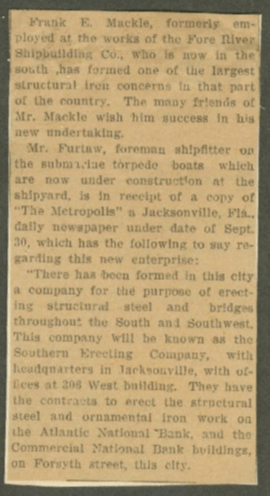
ATLANTA
In 1911 Frank moved his family to Atlanta Georgia where they lived for the next ten years or so.
In Atlanta, his second son Robert was born in1912.
And on July 23rd, 1916 his son Frank Junior came in to the world.
In Atlanta Frank Senior achieved considerable success. He operated as a General Contractor, but soon expanded into the design-build business. In addition to contracting for others, he would acquire land, plan a building or project and sell the package.
Frank Senior was about 30 when he moved the family to Atlanta. During the next ten years he was a leading builder in the area.
BUILD NOW! was the headline in many of his advertisements.
During World War I Frank Senior was heavily involved in military contracts. Major expansion work at Fort McPherson and Fort Gordon were done by him.
As for many young men, the World War and the recession that followed brought unexpected changes.
In late 1918 and early 1919 Frank built ships again - in Philadelphia this time. This was apparently a short-term diversion. A December 18, 1918 article in the Atlanta newspaper noted that "F. E. Mackle has returned to shipbuilding...(and)...will return to Atlanta in the Spring".
He continued to advertise his construction business in Atlanta during this period.
Between 1911 and the early 1920s a number of projects were completed from his Atlanta headquarters. They include the steel work of the Cecil Hotel, the Third National Bank Building and many apartment buildings and commercial projects in addition to the military work of this period.
Reaching out in other parts of the South, Frank was the contractor on the Gesham Hotel in South Carolina as well.
Frank had taken up golf by now and was an active member of at least one club in Atlanta. Atlanta newspaper articles report the results of the Mackle Cup Tournament at the Capital City Country Club.
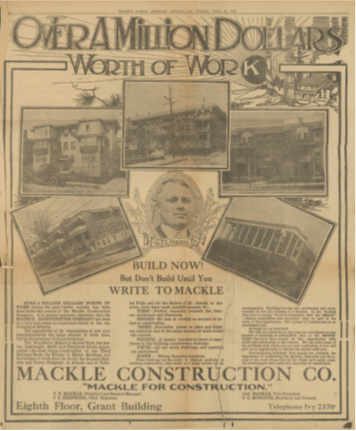
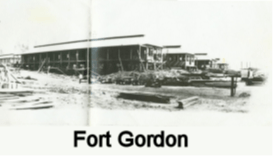
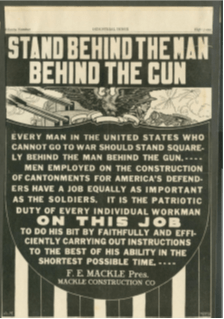
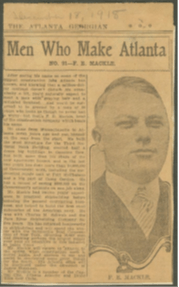
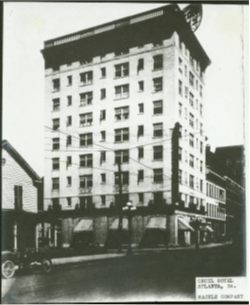
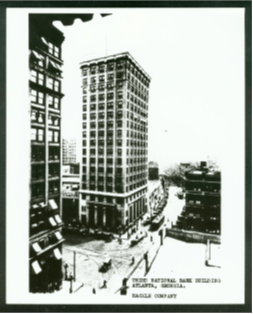
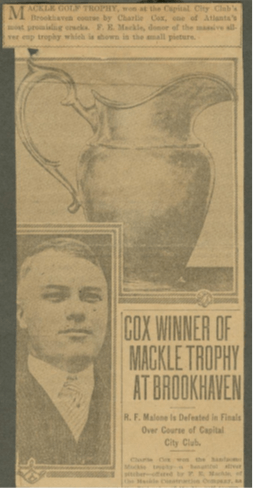
BUILDING AND MARKETING – TWIN BUSINESS TRADITIONS
Frank senior, it seems, had a streak of the "promoter" in him. From the first article written on his move to Jacksonville and throughout his life examples can be seen.
He always relied on advertising and publicity as a source of new business - a novel thing in those days for a commercial builder.
The constant theme was "Build Now!"
He was given great credit in articles written at the time for being a visionary and for his enthusiasm in the midst of a post-war recession.
The idea of design-build also required a great deal of "salesmanship". This was not a man waiting for business to come in the door! He was aggressively seeking and making business opportunities.
These were traits - along with the basic construction skills - that he handed down to his son Frank Jr.
Those skills and the optimism which went hand in hand served both of them well.
In 1920 or 1921 his father was forced to declare bankruptcy. I do not know specifically what events that led up to this. That may have been the reason for their move from Atlanta to Scranton, Pennsylvania.
After World War I there were two serious recessions - the first in late 1918 and early 1919 and the second from January 1920 thru July 1921. The 1920-21 recession still rates as the fourth worst annual decline in the Dow Jones Industrial average ever.
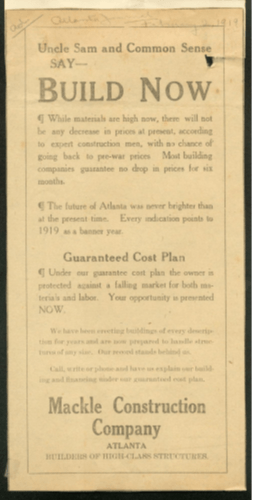
SCRANTON
In the early 1920's the Mackle family moved to Scranton Pennsylvania where they lived until 1924.
An article from this period refers to his new ownership - with two partners - of the Tannersville Hotel. Tannersville is a town 30 miles southeast of Scranton. The article goes on to say, "the Mackle Construction Company of Scranton... will do the (renovation) work"
Interesting that Frank's father, James Mackle, was - among other things - an Innkeeper, Frank Senior was once an owner of a hotel, and his three sons would be hotel operators as well!
A line in this article states that, "the building will be fitted up with steam heat, hot and cold running water and electric lights, a private plant to be installed in case the electric wires are not extended to Tannersville this year."
Carbondale, a town about fifteen miles northeast of Scranton, was the site of other work. One headline reads "Mackle Co. Completing Work on Three Projects" which included two garages and the Calabro Hotel.
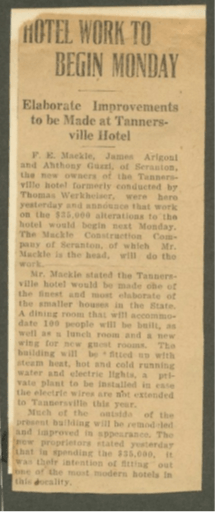
BIRMINGHAM
In 1924 the family moved again - this time to Birmingham, Alabama where they lived until 1933
.
In Birmingham, there was again great success in the early years.
The archives contain clippings about a number of commercial buildings and homes built in the Birmingham area. Prominent is the construction of the eight story Medical Arts Building.

Also featured in the family archives - in the year or two prior to the 1929 stock market crash - are articles about the construction of the Rocky Ridge Golf and Country Club in Birmingham. The work on the new club was done by another contractor but the contract was let and supervised by the President of the club - Frank E. Mackle.
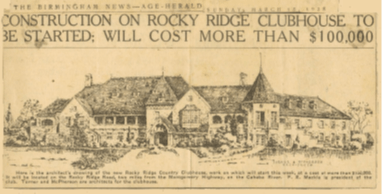
The last clipping of new projects in the family archives of Mackle Construction while headquartered in Birmingham are of the Gesham Hotel building in Colombia South Carolina in 1928.
There are clips of the company still working on the Birmingham Medical Arts Building in 1931.
But there is no record of new work or contracts.
The Crash of 1929 apparently caught up with Frank and his work. The next records are of Frank and Theresa and their boys in Nashville in 1933 where letters indicate the difficulties in restarting the business there.
According to Elliott Mackle Jr. his father, Elliott, started college at Washington & Lee University in Virginia. That would have been around 1926. Robert also went to Washington & Lee University around 1929, dropped out for a time but later graduated from the University of Alabama.
There are two stories that Frank Jr. told about his father that come from this period
One was of a building constructed for Coca-Cola for which he was offered stock in lieu of cash. He took the cash. Of course, the stock would eventually be worth a fortune.
The other involved a situation - apparently witnessed by his son as a young man - where a drunken black laborer challenged his father, and his father backed the man down by the sheer force of will.
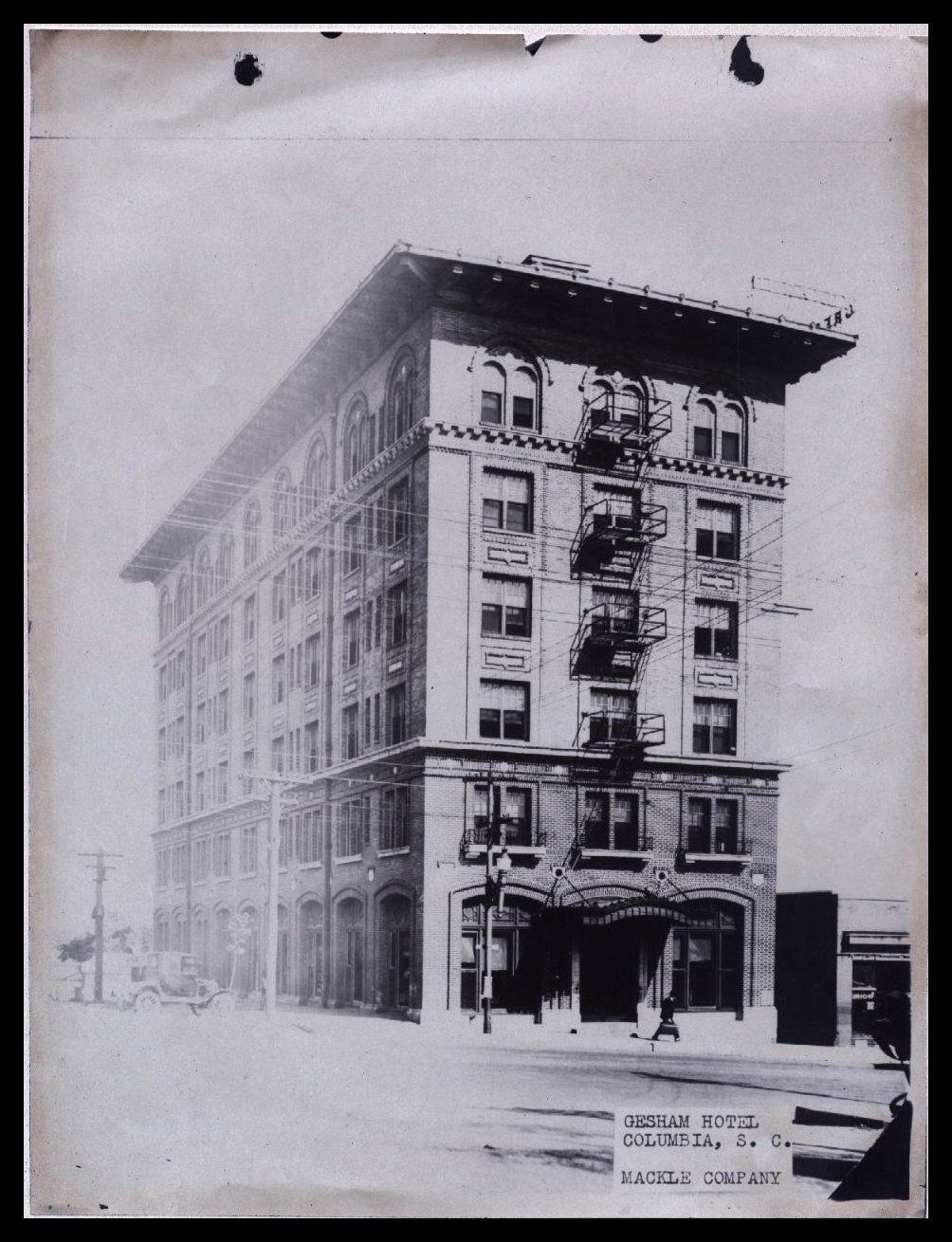
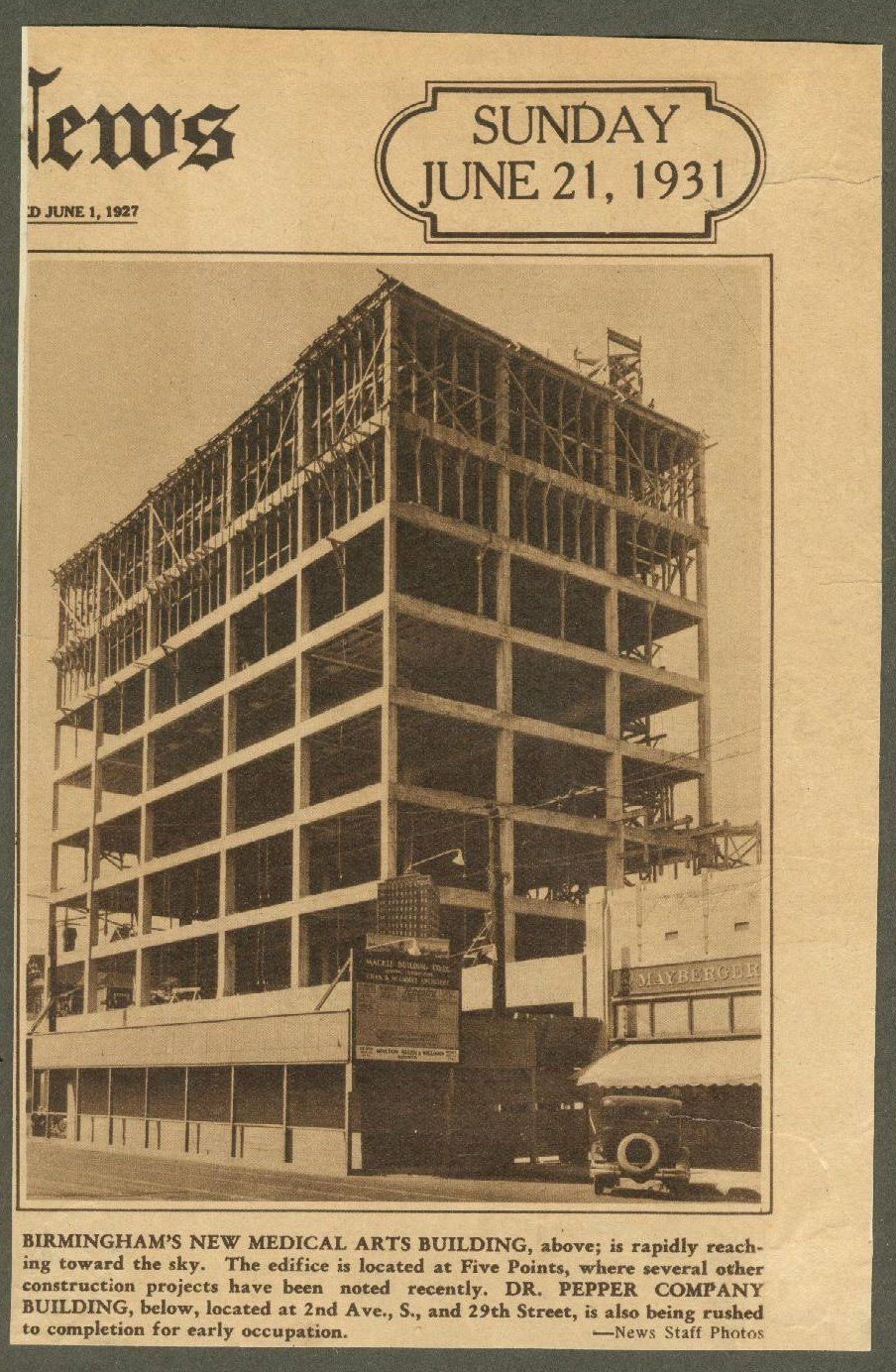

NASHVILLE
In 1933 the family moved from Birmingham to Nashville. As was stated there is nothing in the Mackle archives between 1928 and 1933. Clearly from the records that follow, it was not a good period.
Times were harder for many, but Frank Sr and his family experienced it as well!
Frank Jr. told of being sent to live with his Aunts Katherine and Julia (Theresa’s sisters) in Quincy Massachusetts to finish his high school as family finances were strained.
In 1993, after Frank Jr. had passed, an old tin box was found in his desk drawer. He had never shared them with anyone. In the box were several letters written to him by his father between November 1933 and March 1934…. Frank Jr. had kept them close for sixty years!
They are the first records of the family in Nashville.
Excerpts from those letters to his young son tell the story of those early days.
November 11, 1933
We have just rented the place on Fairfax Ave. near West End (area) and will have the phone, lights etc. in place on Tuesday and get moved in by Wed. or Thursday. I sure will be glad to get settled and this time for good.
November 28, 1933
It will be O.K. to come home Xmas and you can be very sure not only myself but all the rest will be glad to see you … things really look good here. I cleaned up all those bills business and personal amounting to about twelve hundred and on top of that we don’t have to worry about money until the spring at least
January, 1934
There is little or no news here about business except that we are still on the go after new work
March 1, 1934
Glad to tell you I signed my first contract yesterday afternoon and was given another last night if the estimate comes out O.K. and I think it will
Later in March 1934
Mother is as pleased as can be to know that yore old dad is still able to knock em for a goal. What pleases me so much is that the big dream of my precious boy going to the school he wants to looks more and more like a reality.
And there was one letter from his mother, relating the good news of the recent contracts and filling him in on his brothers.
March 3, 1934
Elliott was laid off the CWA today, his last pay from them, but he has a temporary job to go to Monday, in the State Health Dept., about a month’s job. But he is really trying to get something permanent, and I never saw him working so hard. Robert had a talk with his bosses in Montgomery about quitting, and the way he put it about staying on there with them was, they are better salesmen than he is, meaning I guess, that they urged him to stay. You see he only has two more months on the contract he signed with them, then they are supposed to give him a better job, and I think he did a wised thing finishing out his six months. He isn’t very hot for the insurance game, that is the whole trouble.

Things were looking up though!
By September 1934 they were able to send Frank Jr. to Vanderbilt. Frank Jr related that he had dreamt of going to the Naval Academy but the cost of going prohibited it. At Vanderbilt, in Nashville he would be able to commute from home.
By 1935 Frank Sr. was doing well enough to build a new family home in Nashville.
And by February 1938 they had bought a second home in Delray Florida where they spent that winter!
By 1938 sons Elliott and Robert were working for their father. And with Frank Jr’s graduation in the Spring of 1938 the Mackle brothers were working together for the first time.

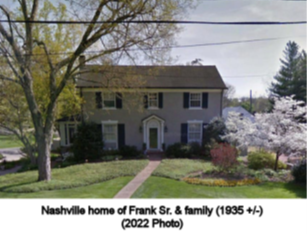
FLORIDA
By the end of 1937 Frank Senior's business had improved to the point where a winter trip to Florida was possible. In February 1938 an article ran in the Nashville paper that he had purchased a home in Delray Beach and the family planned to "winter" there.
About the same time, he also acquired 22 building lots there. His plan was to spend the winter of 1938-39 in his new vacation home and build and sell a few houses - just to keep busy. With that in mind he sent is sons Frank Jr., recently graduated from Vanderbilt, and Robert to Delray Beach in the latter half of 1938 to begin building the models or spec homes.
Son Elliott had married in the fall of 1936 and had remained in Nashville with his father and Mackle Construction.
In October of 1938 permits were issued for twenty homes. The plan was for the boys to start building on half of the lots before their father came down. But before their father could arrive Frank and Robert reported that they had already sold the first ten homes!. Their father gave them a go-ahead on the last ten. Soon they were sold as well!
Frank Senior saw the bright future that Florida held and soon made the decision to relocate the business and the family to Florida permanently.
With the success of an early "test" Frank Sr. moved the business and the family permanently to Florida in 1938 or 1939.
In Florida, Frank Senior - now in business with his sons Elliott, Robert and Frank Jr. - built homes in Delray Beach, West Palm Beach and Miami.
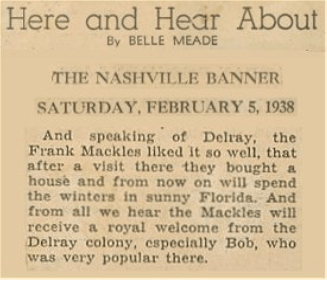
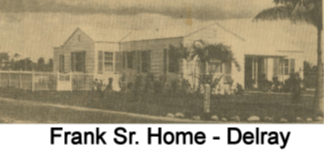
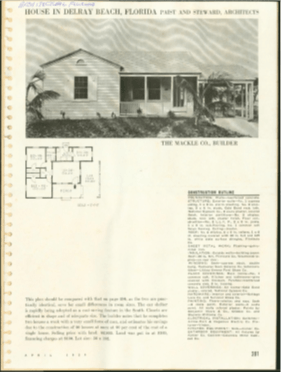
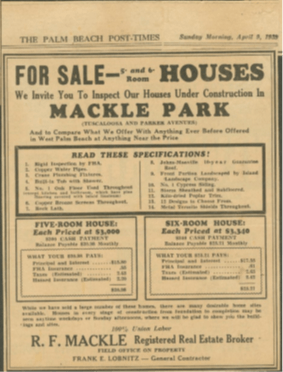
By 1940 Frank and Theresa had moved to Coral Gables and Miami became the focus of their building activities.
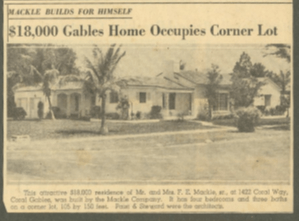
Near the end of his life - a year before the U.S. became involved in World War II - he was again bidding on military projects.
In 1940, the Navy requested bids for 200 houses in Opa Locka - in the northwest section of Greater Miami. In December 1940 the Mackle Company was awarded the contract for $550,000 - $2,750 per house.
Proud of his achievements for the government during the previous war Frank Senior and his sons completed the 200 houses on time and under budget.
The story was told that he went back to the Navy officer-in-charge proud to return the savings to the Navy that they had achieved. Shocked that anyone would return money to the government - and apparently concerned that his allotment for future projects would be cut - the officer refused the refund.
Frank Senior was so appalled that he used the money to purchase items such as garden hoses and other "extras" and incorporated them into the homes.
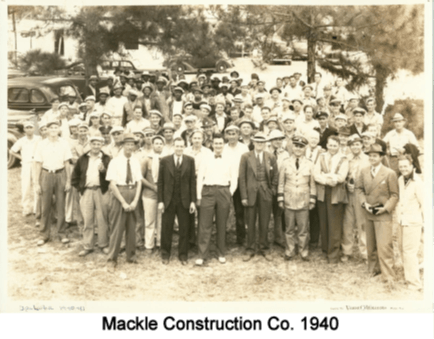
At the end of his life, he and his sons began bidding on work for the Navy in Key West.
Frank E. Mackle Senior died in Miami on October 27, 1941, at the age of sixty. It was a remarkable life and business career - a classic American Immigrant success story.
And it set the stage for the story of ...
Florida's Famous Mackle Brothers.
